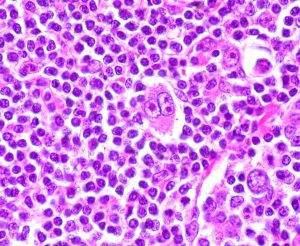FDA Grants Accelerated Approval to Nivolumab in Classical Hodgkin Lymphoma
More interesting news around PD-L1 for use in Classical Hodgkin lymphoma with specific indications as below. Another increasingly common example of companion diagnostics and personalized immunotherapies.
 On May 17, 2016, the U.S. Food and Drug Administration (FDA) granted accelerated approval to nivolumab (Opdivo; Bristol-Myers Squibb) for the treatment of patients with classical Hodgkin lymphoma that has relapsed or progressed after autologous hematopoietic stem cell transplantation (HSCT) and post-transplantation brentuximab vedotin (Adcetris).
On May 17, 2016, the U.S. Food and Drug Administration (FDA) granted accelerated approval to nivolumab (Opdivo; Bristol-Myers Squibb) for the treatment of patients with classical Hodgkin lymphoma that has relapsed or progressed after autologous hematopoietic stem cell transplantation (HSCT) and post-transplantation brentuximab vedotin (Adcetris).
The approval was based on two single-arm, multicenter trials of nivolumab in adults with relapsed or refractory classical Hodgkin lymphoma. The trials enrolled patients regardless of programmed death ligand 1 (PD-L1) expression status on Reed-Sternberg cells. The primary efficacy endpoint was objective response rate (ORR) as determined by an independent radiographic review committee. Additional outcome measures included duration of response (DOR).
Study Findings
Efficacy was evaluated in 95 patients previously treated with autologous HSCT and post-transplantation brentuximab vedotin. Patients had a median of five prior systemic regimens (range, 3–15) and received a median of 17 doses of nivolumab (range, 3–48). Single-agent nivolumab produced a 65% ORR (95% confidence interval [CI] = 55%–75%), with 58% partial remission and 7% complete remission. The median time-to-response was 2.1 months (range, 0.7–5.7 months). The estimated median DOR was 8.7 months.
Adverse Reactions
Safety was evaluated in 263 patients with relapsed or refractory classical Hodgkin lymphoma. Ninety-eight percent of patients had received autologous HSCT. Patients received a median of 10 doses of nivolumab (range, 1–48) at the approved dose-schedule. The most common (≥ 20%) adverse reactions of any grade were fatigue, upper respiratory tract infection, cough, pyrexia, and diarrhea. Additional common adverse reactions (≥ 10%) included rash, pruritus, musculoskeletal pain, nausea, vomiting, abdominal pain, headache, peripheral neuropathy, arthralgia, dyspnea, infusion-related reactions, and hypothyroidism or thyroiditis. Other immune-mediated adverse reactions occurring in 1% to 5% of patients included rash, pneumonitis, hepatitis, hyperthyroidism, and colitis. Serious adverse reactions were reported in 21% of patients. The most common serious adverse reactions, reported in 1% to 3% of patients, were pneumonia, pleural effusion, pneumonitis, pyrexia, infusion-related reaction, and rash.
A new “Warning and Precaution” was issued for complications of allogeneic HSCT after nivolumab. Transplant-related deaths have occurred, and health-care professionals should follow patients closely for early evidence of transplant-related complications, such as hyperacute graft-vs-host disease, severe acute graft-vs-host disease, steroid-requiring febrile syndrome, hepatic veno-occlusive disease, and other immune-mediated adverse reactions. The FDA has required the manufacturer to further study the safety of allogeneic HSCT after nivolumab.
Continued approval for the classical Hodgkin lymphoma indication may be contingent upon verification of clinical benefit through a randomized phase III trial.
Source: The ASCO Post
Other information:
FDA Approval for Nivolumab for Renal Cell Carcinoma
FDA Approval for Nivolumab for Non-Squamous Non-Small Cell Lung Cancer
FDA Approval for Nivolumab with Ipilimumab for Melanoma
FDA Approval for Nivolumab for Squamous Non-Small Cell Lung Cancer
FDA Approval for Nivolumab for Melanoma
Source: Food and Drug Administration
































